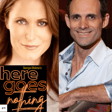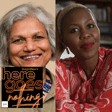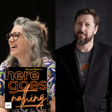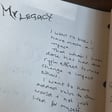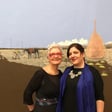Become a Creator today!Start creating today - Share your story with the world!
Start for free
00:00:00
00:00:01

Season 2, Episode 2: Musical Theatre with Andrew Baker and Guest Interviewer Claire Nichols
There are few genres that elicit so polarising an opinion amongst casual and passionate theatregoers as musical theatre, but it's hard to deny that when you get amongst a group of passionate musical lovers, the energy is infectious. Join Andrew Baker and Claire Nichols as they discuss how musicals changed them, the importance of community theatre, pre-show sherry, positive artificiality, and buying CDs at "That's Entertainment" in Old Theatre Lane. From touring shows to venue challenges to jukebox musicals to the gateway drug that is Andrew Lloyd Webber, get ready to have a good "theatre cry" and consider what happens when you have just enough talent for it to be a problem.
SHOW NOTES (links live on show page)
- Claire Nichols
- The Book Show
- Andrew Baker
- Minderoo
- The Premiere Collection
- WAAPA
- Western Sky Projects
Named Musicals (selected)
- Les Mis
- JCS
- Oliver!
- Joseph
- Chess
- Rent
- Pacific Overtures
- Hello Again
- Anything Goes
- Evita
- The Book of Mormon
- Matilda
- Cats
- Miss Westralia
- Tony Galati
- Bat Boy: The Musical
- Lady Macbeth Played Wing Defence
Transcript
Introduction to Musical Theatre Enthusiasm
00:00:06
Speaker
There are few genres that elicit so polarizing an opinion amongst casual and passionate theatre goers as musical theatre. But it's hard to deny that when you get amongst a group of passionate musical lovers, the energy is infectious.
00:00:21
Speaker
Today on Georgia Malone's Here Goes Nothing, we meet Andrew Baker, head of vibrant and connected communities at Minderoo Foundation, but also an massive advocate for musical theatre in all its forms.
00:00:34
Speaker
As a musical performer, director, producer and passionate attendee, Andy takes us on a whirlwind tour through a discussion of why musical theatre is so meaningful to him.
Claire Nichols and Andrew Baker: Passion for Theatre
00:00:46
Speaker
Joining Andy is the wonderful Claire Nichols, who you might know from ABC Radio National, who shares Andy's love for this fabulous medium and her childhood in the 80s.
00:00:57
Speaker
Enjoy this chat. It's a good one.
00:01:07
Speaker
Well, what a pleasure and an honour to be hosting this episode of Georgia Malone's Here Goes Nothing. My name is Claire Nichols. I'm an arts journalist, but most importantly for this chat, I'm a big musical theatre nerd and I'm so happy to be here with my friend Andrew Baker. Hello. hi Claire.
00:01:23
Speaker
Okay, so we better say why you are the guest of honour for this. So ah you are a performer, you're a director, a producer, an arts administrator, but most importantly, like me, a big musical
Musical Theatre vs. Serious Theatre: A Comparative Discussion
00:01:37
Speaker
theatre nerd. Huge musical theatre nerd, musical theatre Yes, musical theatre ruined slash, you know, made my life. Do you know, I think it's so funny that we always say musical theatre nerd or musical theatre tragic, like we're already apologising.
00:01:51
Speaker
Exactly. I feel the same way. um Musical theatre is always sort of feeling like the the the poor cousin. To serious theatre. Exactly, exactly. And sometimes I feel like it's a victim of its own success a little bit.
00:02:03
Speaker
So, um yeah, it's a bit, yeah it's easy to be bullied for loving musical theatre when you're younger, but then I feel like people grow into it just a little slower than others. Yeah, maybe over the next hour we can like let go of that kind of musical theatre nerd shame and call ourselves musical theatre champions or something like that. That great. Advocates. Champions is good. Okay, so I said performer, director, producer, arts administrator. How do you describe yourself and what you do?
00:02:28
Speaker
Yeah, it's a really great question. I think i I'm an arts worker. That's how I describe my um sort of patchwork quilt of a career over the last 10 years or so. But it was musical theatre that nudged me into having any kind of real arts practice or arts passion beyond a hobby way, way back. And it's always been there, whether it whether I was in in a previous career as a lawyer or into my current current role working across a ah range of art forms as ah as an arts funder or representative of an arts funder.
00:03:03
Speaker
Musical theatre has always been there. But yeah, arts worker is what I proudly call
Andrew Baker's Career in Arts Funding
00:03:06
Speaker
myself. It's very kind of you to cook to call me a director and producer and performer. I have been those things various times. They haven't exactly always paid the bills. but so So what's the day job then?
00:03:16
Speaker
So I'm currently, i say currently as though it's going to, you know, it's as temporary. It's definitely not temporary. I'm the head of Vibrant and Connected Communities at Mindaroo Foundation. So we are a major philanthropy that that supports, among among lots of things, arts and culture across Australia.
00:03:31
Speaker
So i'm very proud to have that ah have that have that role, advising on how to best support the arts sector with philanthropic funding, um only a small portion of which is into theatre, unfortunately. LAUGHTER I keep saying telling myself if it were my money, if it was my money, but it's not my money.
00:03:50
Speaker
That must be nice. I mean, Mindaroo is an organisation that has, you know, the power of the Forest family behind it. um Is it nice to work in arts when there is actually money to be spent?
00:04:04
Speaker
it's ah It's definitely a privilege. It's a great privilege to arts. I guess, the other side, and in to to put it really um basically. It brings its own challenges, though, and even in a very privileged foundation with the generosity that we have of the family we work for, um you know, there's there's still some competing demands on those ah resources. um So, look, it's it's a huge privilege to be in that position, and I never, ever forget that...
00:04:33
Speaker
you know, it's it is a privilege and the vantage point I have is a rare one and to treat that really respectfully and, and you know, exercise it with all the humility and, you know, discretion that that is required.
00:04:48
Speaker
But it's a wonderful job and it does afford me some great relationships and great opportunities to speak to artists and arts organisations about their strategies and their needs. And as you know, the needs are just growing.
First Musical Experiences and Influences
00:05:00
Speaker
It's getting harder and harder for artists artists and arts organisations to to flourish and do what they do best for community. So that's the role I've got and it's ah it's a it's a great role. yeah I imagine, you know, like we're saying, there's money there, which is nice, but there's only so much money to go around, right? So when every arts organisation is saying what they want and you want to make all those dreams come true, ah that's that's got to be tough. It it is tough and it's probably a whole other podcast, I guess, which I'd be happy to have. um But
00:05:29
Speaker
Yeah, it's it's also hard to balance yeah all those different arts organisations. Everyone is deserving, but at the same time, we're also always trying to look at it systemically, holistically, and supporting one organisation over another often isn't the question. It's more what's going to shift the dial the most, and ah you've just got to make some tough decisions and be the bad the bad guy, unfortunately, a lot of the time. We say no a lot more than we are able to say yes, you know which is a shame, but... um Hopefully, if we have our strategy right, hopefully we're having impact.
00:06:01
Speaker
Okay. So sometimes you're the villain, but today you are the hero because today we're going to celebrate musical theatre and why we love it. um Do you remember your first kind of musical moment?
00:06:14
Speaker
I do. In terms of musical theatre? Yeah. Yeah, absolutely. It's 100% my mum and dad owning the the rather famous premier collection of Andrew Lloyd Webber.
00:06:25
Speaker
I think it must have been... We're have a lot of familiarity, kind of aha moments together today, aren't we? um You know, late 80s maybe, and they brought that home. And my sister and i just wore that CD out, um which probably ah helps, you know, endorse some of the harsh criticism of angeloid whoever if kids love it you know it's not necessarily the the ah the audience is going for but we loved it and we danced around to it and so that's probably my first introduction to musical language or musical theater type language and sounds and that storytelling because you know these songs i remember i was six i think or six or seven and i remember distinctly thinking that these songs are really different from other songs because there's all these weird words and names like what does that name mean Who is Skimbleshanks? Who is Skimbleshanks, exactly. Or like, um what what is the Starlight Express? You know, there's no other context to that in that sort of um best of album. So I had to ask my mum. Of course, she had no idea. And it was pre-internet. So these songs, completely and devoid of any context, just floated free in our lives. And we just love them. And we know every lyric to every one of those songs on albums. so that was
00:07:31
Speaker
So that was ah the first time that but but I probably didn't know that it was a thing called musical theatre, right? But then Les Mis happened. But just through another compact disc purchase from my parents because they saw the show.
The Role of Musical Theatre in Personal Development
00:07:47
Speaker
They saw Les Mis. This would probably be 92 or something. um And... ah They brought the disc home and we listened to that one as well. And that was the first time I realised that, oh, these songs are in sequence and these songs are telling a story. and And from there um I think I just had a ah broadened curiosity about storytelling through song and a type of music.
00:08:08
Speaker
I think at that age that's when I sort of broke off from a lot of my friends, you know, and no longer really kept my finger to the pulse. My po you know pop music knowledge is about up to date at 1993 so. Same.
00:08:20
Speaker
But I think this is so fascinating because you and I are a similar age. I think I was born in 83. You were born in 84.
00:08:28
Speaker
82. 82, yes. I made you younger. But that touring production of Les Mis that came to His Majesty's, I wonder if we would all be the musical theatre nerds we are without it because I distinctly remember I was living in Karratha.
00:08:41
Speaker
My parents had come to Perth to participate in an amateur ah drama competition. Oh, great. Yeah. They'd won the competition and they'd celebrated by going to see Les Mis. Perfect. And they phoned me. I was in Karratha. was six years old. And and they said, they were like they were giddy talking to me on the phone.
00:09:00
Speaker
Oh, Claire, we've just seen this thing. It's changed our lives. It's so incredible. You're not going to believe it. We can't wait to take you one day when you're older. And then again, they came back to Karratha with that CD. And I think for so many kids of that era, we were listening to The Best of Andrew Lloyd Webber. We were listening to Les Mis.
00:09:16
Speaker
For me, it was also um The Phantom of the Opera album and Chess. See, I took chess off my list in my notes because I thought that's a little bit too, not obscure, but like a little bit left centre. I love chess. My mum and dad had the vinyl, the double vinyl. It must have toured at the same time. I don't know if it toured, but um it was because it was ABBA and Tim Rice, there was some hits in the in the, you know, in the charts, right? So mum and dad had bought the album and imagine me stumbling across that a little bit later on when I learned how to use their record player.
00:09:46
Speaker
They had these other musicals there. But um my goodness, that yeah, that you're absolutely right. And I know that you and I can both list and name every single cast member of that Les Mis international cast recording. and we start talking about Philip Kost, we will never stop. so But Chess, I loved Chess. That blew my mind when I was a little bit older, teen years.
00:10:04
Speaker
But Les Mis came back to my life in a huge way when I was 14. And I remember very distinctly Sunday afternoon, I would have been coming home from a rehearsal from a school musical. And my mum said, I've taped something for you. You should watch it. It was on the ABC on Sunday afternoon or something.
00:10:21
Speaker
And mum sat me down and watched we watched the 10th anniversary concert. So good. From Royal Albert Hall. And I often say that that is the moment that changed my life because from there on in, there was no way that musical theatre wasn't going to be just this huge part of who I am. And ah yeah, so that that was the other pivotal moment, certainly. And Les Mis again.
00:10:43
Speaker
Yeah, and Les Mis is going to come back again in your story. um But you've talked about being in the school musicals, but I want to go back. You and your sister listening to Andrew Lloyd Webber, were you like that kid who was putting on really long, painful shows for your parents? You were absolutely spot on. Me too. Totally, yep. I remember the set that I used or the theatre kind proscenium arch sort of set up using kitchen stools and things. I remember very vividly.
00:11:06
Speaker
Um, but not only at home, but I was that kid in primary school that would come back from lunchtime and basically direct the teacher to give me time to, ah put on a play. And I've directed my fellow school studio students, uh, friends, uh, in putting on these ridiculous plays. None of them were musicals from what I remember, thank goodness, but, um,
00:11:26
Speaker
Don't say thank goodness. We are championing business today. That's true. That's true. I guess what I mean is maybe I would have been traumatised by perhaps not getting the response I wanted to my singing voice at that age. But there were plays and they were think they were inspired by like the Barcelona, the Seoul Olympics or the Three Amigos movie, you know, those sorts of things. And I just went on and on and on completely derailing some poor teacher's, you know, teaching plan for that afternoon. But yeah, i was that person 100%. And of course, like you, i don't think I've stopped being that person.
00:11:54
Speaker
When did you realise you could sing? So it was actually after my voice broke. So I was in a production of Oliver at school, not as Oliver, but as one of Fagin's gang, pre-voice break.
00:12:07
Speaker
And then, you know, the voice break happened and I was singing along at home and my sister had said, oh, you should audition for the next show that's going on at school. And I went in and auditioned. It was for Joseph um and the Amazing Technicolor Dreamcoat.
00:12:20
Speaker
And got into that. just as chorus. And then, no, I had a solo. I did have a solo. so i So at that point I knew I could sing. It was when I was in my early teens.
Community Theatre and Its Impact
00:12:29
Speaker
And I do remember my mum, in retrospect, what she was doing was making sure that I wasn't going to make a fool of myself because she'd never heard me sing.
00:12:38
Speaker
And here I was suddenly auditioning for musicals and getting these small roles. So she pulled me into her bedroom once and I was like, Like, tell me what you're going Sing for me. And think she was just checking that was going to not make a fool of myself.
00:12:49
Speaker
Yeah. So early teens is when I realised that I could sing and I loved it and I began getting the occasional singing lesson and really taking it a bit more seriously. Did your mum give you a good review when you sang for her? shit That is a deep psychological question, isn't it?
00:13:03
Speaker
That's what I do. I like to ask people about their mothers. You go right for the jugular. I would say the review was tepid at best, but but knowing my mum and my dad, they would if they had concerns, they would have...
00:13:17
Speaker
Gently, you know, guided me elsewhere, maybe back to the cricket pitch or something. But I think I just had enough going for me that I thought, oh okay, he's not going to get full of himself. And clearly this is going to get his energy out, his creative energy. So it's good for the whole household.
00:13:31
Speaker
I think it's fantastic that your school was doing musicals. You're so lucky my school didn't that. We've talked about this, haven't we? You were at Rocker Stedford School. I'm Rocker Stedford. Which is great. I've met so many people over the years who just adored their time in Rocker Stedford and used to be such a big thing on TV. and But I went to a school that did musicals, yeah.
00:13:48
Speaker
And so you did Oliver? you Oliver. did Joseph? Yes. Then ah infamously there was a year off, which i was absolutely horrified by. it um And then in year 11 it was West Side Story where got the role of Tony. um And yeah, that was a very important period where it was really difficult. Surprise, surprise. I mean, gosh, 15-year-olds doing maria West Side Story. and you know So a big learning curve, but it didn't it didn't knock me around too much and You know, that there was this thing i went, i went through the Catholic system and there was this Catholic performing arts ah awards annual thing that happened and we got invited and we won the best musical thing that year.
00:14:27
Speaker
And we got to perform on stage at the concert hall. And I had a couple of strangers come up to me afterwards and just give me the kind of feedback that my sort of more reserved family perhaps wouldn't, um, not because they didn't love me, but just because, you tall poppy stuff, they're scared of it, scared of that stuff.
00:14:44
Speaker
Um, You know, I had a couple of people come out of the the audience and after the show and just find me and just tell me some really nice things. And again, it was just this reinforcement that, okay, Tony West Side Story is nothing to be sneezed at. So, okay, I've probably got a little bit of talent here. And it was around that time that an uncle of mine looked me in the eye.
00:15:05
Speaker
it was probably after a West Side Story performance and said, you've got just enough talent for this to be a problem for you.
00:15:13
Speaker
I'll never forget. I know what he meant at the time, but I now know what he meant. Yeah? Yeah. um And so you have this success, you have this talent, and you go, I'm going to be a lawyer.
00:15:25
Speaker
I think it's classic. I think it's absolutely classic. and Yeah, what do you do when you're a relatively... you hardworking, slightly high achieving, attention seeking guy who can't do maths and science.
00:15:38
Speaker
um I hadn't heard of WAPA, for example, until very late in high school. So it didn't really seem like a... a thing I should pursue. So I was always on track to do something like law. And I i got into um into law school and yeah, did that.
00:15:52
Speaker
Is there, mean, I'm a frustrated performer, right? and And I think being a journalist, I get to channel absolutely um some of that performance into doing this. I get to pretend I know what I'm talking about every day. um And, you know, I get to perform in a way. is Is there an element of being a lawyer that kind of scratches that performance itch?
00:16:12
Speaker
I think if I had chosen a direction that took me into litigation, but Weirdly, I didn't. I had the opportunity to, but I decided to go into a much drier area of law because I just... It was literally one of those things of my friends are doing that, so I'm going to go do that.
00:16:26
Speaker
So i didn't end up in like a job that was going to get me to court at all, really. I did a couple of small embarrassing appearances like every junior lawyer
Andrew's Professional Theatre Journey
00:16:34
Speaker
has to do. But um no, I think the theatricality I was able to kind of almost sideline a little bit, but certainly when I've had my professional roles in offices over the years, I've certainly...
00:16:47
Speaker
been a little ah famous for being one of the more eccentric, perhaps colourful characters in the office. but But no, I wasn't one of those frustrated performers who went into being a flamboyant barrister, for example, um mainly because I didn't have the the the wit or the brain for it. But it's just ah one of those sliding doors moments. I ended up in a front-end contract lawyer type role.
00:17:07
Speaker
But you were studying by day and doing musicals by night because this is when we met. yes You were studying law and we met Playlovers Amateur Theatre Company in Floriat, you know, this fabulous community theatre organisation that's just shaped so many lives. yeah um Should we make a case for why community theatre and community musicals are so wonderful?
00:17:35
Speaker
Yes, we should. it's it's i don't think it's a hard case to make. I think the ah the concept of an ensemble, I'm a sports fan, but I honestly think we always talk about teamwork and and and use sporting analogies, but nothing is more functional and and productive and uplifting as a team in ah in a musical theatre, in in a community musical theatre production. It's just the best environment. It's so much fun.
00:18:00
Speaker
You make lifelong friends that you might not ever you know see too often, but you just make these crazy deep connections. And it's the type of community engagement, community involvement that is seemingly on the wane a little bit, which is a shame. um But I'm only speaking sort of anecdotally, I guess, in terms of theatre particularly. But it does seem like the club environment has shifted. It's not as strong as it once was. But again, I could be proven wrong there. No, I think you're right. I remember even the generation before me at Play Lovers, um that was a group of people that just did every show. yeah right It didn't matter if they thought they'd be good for it. It didn't matter if they didn't think they'd be good it. they were part of this kind of community, this ensemble, and they would just do show after show after show.
00:18:42
Speaker
And I think even in our era, there were people there who were doing, say, the WAPA certificate course at night. They already had stars in their eyes. Community theatre was a stepping stone to something else. And there wasn't that same club loyalty that I think had been there in the generation before us where you go, I'm a play lover's person and i'm um you know I'll never be seen at Limelight because I'm a play lover's girl.
00:19:05
Speaker
um Whereas I think these days it's more about where is the right musical for me? Yeah, what's the next big exciting musical to do? Yeah. And I think the other thing we should mention about community theatre and the best reason to get involved, where else will you get a glass of the world's cheapest sherry for free before the show? Absolutely. I never got over how excited people were about that. Yep. I was. I remember like one show, like sneaking a tray of them backstage and everyone having a little nip really rotten sherry.
00:19:34
Speaker
Before we went on stage. Absolutely. it's just I'd forgotten about that. That's a great tradition. I hope that out there in the music musical theatre club land, hope that's still happening. Look, I went to a musical about five years ago. I think it was at Melville and they still had the sherry. And I was thrilled. I know Old Mill does it.
00:19:50
Speaker
Old Mill in South Perth. Yeah. yeah yeah Fantastic. Let's maintain that tradition. So the show we met on was Jesus Christ Superstar. Yeah. And that was and unbelievable production. I think even looking back now, the talent on stage, people like Gillian Binks and Paul Whiteley. like we were Susie Mathers. Susie Mathers went on to be Glinda. She you know she had one line, see you my eyes, I could hardly see. That was it.
00:20:14
Speaker
um But, you know, we had this incredible collection of talented people. I think we all knew it was a really special show as we were doing it. I remember people weeping in the audience every night. yeah um And I think that show is always going to have an incredible place in my heart. Me too.
00:20:32
Speaker
Let's talk about some of the other big shows for you, Andrew. Like what, you know, if you had to kind of make your... your love letter to musicals, the musicals that have changed you. Do you want to run through couple of Yeah, great. And everyone's got this list and my and my my list, like yours, I'm sure changes every day. But, you know, with a little bit of structure to it in terms of what came first, we've already talked about Les Mis. That was a very influential musical for me and all of the Lloyd Webbers, well, nearly all of them and that I could find in my in my early days.
00:21:06
Speaker
early days But as I went through high school, ah we were 90s kids and I'll never forget walking into drama department at at um my school and hearing this rock music going on and not knowing, what is that? That sounds so um cool.
00:21:20
Speaker
and it And it was, of course, Rent. ah And Rent was the first time that I really understood that musical theatre as a form can really deal with just the most... diverse topics, serious things, ah things that are gritty and controversial, and that musicals have their own life. And that's when i first realised that these things don't just drop from the heavens or these things don't just come from, i don't know,
00:21:46
Speaker
rich establishment people who write, you know, in the ivory tower or something. I read up everything I could about Jonathan Larson and his story and how the show started in the grimy, you know, downtown or the lower lower west Lower East Side kind of stuff in New York.
00:22:00
Speaker
um So Rent changed... And of course, being increasingly aware of me being queer in the 90s, like it spoke to me on that level, even though I didn't really know what was going on.
00:22:13
Speaker
ah Yep. And then um Chess, you mentioned Chess, which is kind of serendipitous because I would walk around the house belting those absolute bangers out. Chess is due for, I mean, it's coming back to Broadway, actually. They're doing Broadway production next year.
00:22:27
Speaker
It always seems to flop when they do it. Because people are playing chess on stage. it Yeah. this Yes, that is a problem. So chess that chess was originally written as a concept album, right, by the guys from ABBA. And the music is unbelievable. The songs for the two women are just, you know, they can't be beat. And, you know, anthem for the blokes. Exactly. But I think staging it is always a problem because there's two people sitting around a table playing moving tiny, tiny sentences.
The Emotional Power of Musicals
00:22:54
Speaker
Yeah, you're right. You know what? You're absolutely right. I've seen it once. The production company in Melbourne did it. And it was – I loved it because I'm a huge fan. But, yeah, complicated and a little bit dry and literally the last – what is it A 12-minute song at the end of the show telling the history of chess.
00:23:08
Speaker
But if anyone thinks that the – I don't think too many people listen to this going to think that the ABBA guys are you know overrated. But – musically and technically phenomenal artistry, genius script and score, sorry, score and lyrics by Tim Rice. So, you know, Tim Rice um famously had the falling out with Angeloid Webber and jumped across to work with the Abba guys.
00:23:29
Speaker
So after chess, I think, I moved into when I was at law school coming across the great Stephen Sondheim. I still can't remember exactly why. It was probably friends through the musical theatre club world who mentioned Stephen Sondheim and I'd done West Side Story not even knowing that this guy, Stephen Sondheim, yeah wrote the lyrics and...
00:23:49
Speaker
When he was almost a kid. Yes, he was so young. i mean, yes, he was such a giant. And it was i should be careful, but, you know, in those early 2000s when we all had the the naughty music sharing kind of, you know, early...
00:24:04
Speaker
um plagiarism stuff. I just downloaded anything I could of Steven Sondheim and I think I listened to yeah nearly everything he's ever written. So that was also around the time that I be at uni, that's when I heard of such a thing called WAPA really. And I went along and and and i and I saw Merrily Will Roll Along done by some really talented students. I saw Pacific Overtures.
00:24:24
Speaker
Wow. I reckon I'm probably the only person in Australia who has seen Pacific Overtures three times, which is – that's another conversation. But I've seen every amateur production and student production of Pacific Overtures, which is such an underrated piece of writing. I've never seen it. Well, it's rare it's hard to see, but have a listen to some of the songs in that show. It's it's just like Sondheim. He chooses – with his collaborators – choose such interesting – you know, niche topics. This is all about the opening up of Japan to the West and colonialism and all of that. And it's just fascinating.
00:24:58
Speaker
So Pacific Overtures and then the more classic or more well-known Sondheims. But there was also this vein of lesser-known works, Ragtime. When I say lesser-known, lesser-known to perhaps Australian music theatre fans, like Ragtime, Parade.
00:25:12
Speaker
Jason Robert Jason Robert Brown, Parade. I've met him. Oh, have you really? Yeah. Have you interviewed him? Yeah. wow. That's incredible. He said writing a song is like pulling teeth from a shark. Whoa. I'll forget that.
00:25:23
Speaker
Okay. Anyway, he was pretty cool. I'm not a songwriter, but I can – that is evocative, isn't it? Yeah. I mean, he's the – they call him one of the natural, you know, successors of people like you sometimes. And he was ridiculously young when he had Parade on Broadway. I think he was 24 or something.
00:25:39
Speaker
So – and the final one I want to mention is – a little musical called Hello Again, which I did when I was at WAPA, and that tipped me into a a type knowing more about the kind of artist that I am and the kind of musicals that I want to spend time and money on. yeah So that's a good fly-through. but There's a lot more. Yeah. well I think, you know, talking about why these different musicals appeal to you, I guess we're really getting a sense of what this art form can be, right? Because I think for someone who doesn't know musicals, it's pretty easy to dismiss them. Oh, they're so silly. People just break into song. yeah um You know, it's theatre for people who aren't too good at acting or whatever it may be. So I guess we can make the case, Andrew, for why musicals matter. Yeah.
00:26:28
Speaker
why we should care about them and why they can be so powerful. Yeah. ah Yeah, where to start? It's funny when, because you've mentioned the, Sometimes it's it's looked down upon by, i shouldn't say by actors, but people assume that it's serious actors do other types of theatre and acting.
00:26:46
Speaker
But, you know, you look at the person who I think has won the most Tony Awards as a performer, and it's Audra McDonald. I'm fairly certain of that. and She's won 110 Tony Awards or something. That's the official number. Exactly. so You heard it here first, yeah.
00:26:59
Speaker
But... She has won those, I think nearly all of them, doing musical theatre. And yes, that's a New York, it's a New York art form at the end of the day. It is an American art form. So it's more respected over there. But Patti LuPone, you know, she is a consummate Juilliard-trained actor first and foremost. and has gone on and had the the the career that she's had in musical theatre.
00:27:19
Speaker
But no, to come back to your question, yeah, I think this is something that has filled books, of course. But I'm going start with what you said about why is it so, I think you said, powerful.
00:27:30
Speaker
And... There's just this undeniable, immutable thing about music. Every culture has some musical tradition and it is universal.
00:27:42
Speaker
So it doesn't matter. It's almost like the in my humble opinion, the music in a musical comes first in the sense of that's the thing that gets the audience, gets the heart of the audience. It might not get the brain yet, but the heart stirs in a way that or earlier in the in the show, in the piece, than than perhaps a play.
00:28:03
Speaker
Music is just a direct line to the heart and that is why... and look, it doesn't work for everyone. When people tell me they don't like musicals, I tend to respond with, you just haven't met the right one yet. 100%. But I think it's the the very unique thing about it, which is the music. It it just cuts through into the heart ah in know in a way that straight-up language...
00:28:27
Speaker
doesn't yet. yeah it's It's a bit slower too. You need the brain fully engaged to listen to dialogue and listen to what's being spoken or what the subtext might be, whereas music just opens the heart.
00:28:38
Speaker
And you can, again, I'm not a composer, but composers have such a rich, palette to choose from to tap into a certain type of emotional response that they that they need in that time in the musical. So I think it's the music that does the powerful thing. And in my and my company um that that I run with a few friends and colleagues, a few years back when were doing one of our, you know, what what are we all about?
00:29:01
Speaker
We kept coming back to this saying, that feeling, quote unquote, that feeling that is hard to articulate. It's hard to really expand on. But the thing that leaves... an audience at the end of a musical just with that feeling, that's the kind of thing we're we're always trying to achieve. And musicals with the combination of the beautiful music, of sort of that ah heightened emotion that...
00:29:26
Speaker
we all need in our lives to see people processing their their big feelings. and I think that's another reason why certain types of kids get into musical theatre. Because we have big feelings. We have big feelings. And we can only sing about Yeah, yeah, absolutely. And there is no other option at a certain point in a script where the only solution here is to sing and to burst forth in song. And I love that it makes just total...
00:29:54
Speaker
logical sense inside the world of that show, inside that theatre, for probably 98% of the audience, it just makes sense. And and it I think it utilises an a degree and scope of imagination for an audience. It it requires that imaginative leap to, yep, they're singing now and that's okay.
00:30:13
Speaker
um not just They're not just singing, but they're trying to advance a storyline through song. And of course, we all know that it's more It's successful more yeah know in some musicals than others, but that's where I'd start.
00:30:27
Speaker
Yeah. One of the things I love about theatre, and I think about this a lot, is one of the magic things about theatre is the artificiality of theatre, right? Like I don't want everything to be real. I want to see the scenes when I go to a piece of theatre.
00:30:41
Speaker
And I think about a show like Les Mis, right? And at the end when they're singing one day more and we all burst into tears and we have goosebumps all over our bodies. Why are we
Theatrical Elements and Emotional Responses
00:30:50
Speaker
doing that? And it's because they have changed the key.
00:30:53
Speaker
They've, you know, done a key change yeah and they are marching on the spot and they are waving a piece of red fabric in the air. Like it's pretty simple. And all these different storylines that, let's face it, Lamy is by musical theatre standards. That sounds a bit apologetic, but it's pretty complex. yeah It's pretty heavy or like layered, right? There's lots of threads.
00:31:12
Speaker
And to see it all come together, and they've we all know that that is ah a ah technique that lots of musicals do at the end of Act One, but... No one's ever done it better, I don't think, than the finale of Act One of Les Mis. So much so that when I saw it in Sydney when I was 15, my dad at the end of it said, that was great, like as as if the show was over.
00:31:31
Speaker
He's like, that was great. And was like, aren't you interested in what happens next? Anyway, yeah, you're right. we We embrace the technical tricks and but also mastery and genius. Because it's amazing. You're going, I'm crying because you're just waving a piece of red fabric in the air and it's making me feel so much. And that show, i've always um i've always thought about this, that...
00:31:58
Speaker
Because that show is all about revolution, yeah in order to get people to stand up and risk their lives, they need to feel those sorts of things. So, of course, you bound out of Act One of into the interval ready to take to the streets and and fight for whatever they're talking about in France. Fight for France.
00:32:15
Speaker
Yeah. I mean, I won't take us down the the wombat hole of Evita on the West End at the moment. Which you've seen. I have. I have. And i won't – my full review is like an hour long, but it's all rave. Like I just loved it so much. But the point is is the the artificiality, that the artifice of theatre.
00:32:33
Speaker
And in the work that I do as ah as a director occasionally – I'm all for the audience seeing how this thing's being made. ah because you don't often have the budget yeah to do anything else. But B, why not? In this day and age where you can just about see anything you want on a screen and you can just about make anything you want come to life on a screen.
00:32:53
Speaker
you know, let's bring it back to the basics. And anyway, with Les Mis, sorry, with Evita in London, they use live filming and there's this beautiful lifting of the fourth wall, literally when Ava Perron delivers her big song, standing on the outside of the physical theatre to the streets of London.
00:33:14
Speaker
they film it and go back into the theatre. And those of us have spent hundreds of pounds to see it inside, sit watch it on the screen. But A, it's genius, you know, just... for the story, which I won't go into, but B, just that fact of, yep, this is being filmed. You all know it is.
00:33:29
Speaker
Those people out there on the street aren't actors. They're real watching this thing. they're tourists walking past. It doesn't matter. it it It all comes together. And that's the magic of creativity in theatre. There's nothing like it. And I guess this is, what again, why we buy an art form where people break into song. We are fine with that artificiality. We love it. Yeah, absolutely.
00:33:47
Speaker
um I did want to also sidetrack into what I like to call theatre cries. Great. Yeah. Great. Just, you know, you do, um you know, I do cry at the end of Les Mis. I cry in all sorts of things.
00:34:00
Speaker
And we've made a case, I think, for um really kind of important musicals. But ah I want to argue that one of the biggest theatre cries I've ever had was in a production of Anything Goes on Broadway with Sutton Foster. Amazing. um so Anything Goes is, it's a collection of Cole Porter songs loosely connected by a pretty dodgy theme. It's, you know, it's kind of like the Mamma Mia of, Yeah, it's original Jukebox musical. But I watched this production and Sutton Foster was tapping there was this incredible big number for Anything Goes.
00:34:33
Speaker
And the choreography was so beautiful. I should mention I dabble in choreography. like dance. is a choreographer, amazing dancer. The choreography and the spacing was so beautiful that I burst into tears at interval just because it was such a beautiful thing to see.
00:34:47
Speaker
And I want to argue that A musical can change your life, but also a musical can just be fun. And that's okay too. My goodness. um Don't, you know, yeah, we should never apologise for musical theatre simply giving people. If all it's giving is a night of escapism and a night of wonder and awe because those those bloody lines are so beautiful, and then that's good. You know, it's absolutely an inherent, important, virtuous good in itself, that beauty.
00:35:17
Speaker
So important. I'm trying to think of an equivalent moment where I... burst into tears because of the technicality of the the brilliance of it. And it could be when I saw, ah well, actually The Lion King, the the music does it for me, of course, and there's links back to childhood, but just the creative, just wow of that clever, can you imagine when when that was first pitched as the the way they're going to put Lion King on stage? We're going to use puppets.
00:35:41
Speaker
Anyway, it works extraordinarily well. But also the tap routine in Book of Mormon. Turn it off. Yeah, turn it off. It's something that gave me huge chills and goosebumps and just thought, yeah, this is the this is the pinnacle.
00:35:56
Speaker
you know i'm on broadway I'm watching on Broadway. Now I'm going down a Broadway trip rabbit hole, but Pippin, I saw the revival of Pippin in 2015 or something and I wasn't nearly wasn't going to go.
00:36:09
Speaker
But the way they – i would I would argue that they did storytelling so technically beautifully that it moved me in a way that I can't believe how much respect they're showing to the audience and to this story.
00:36:20
Speaker
They're not taking the yeah're not taking the mickey out of it because it is a bit silly. Pippin's kind of famously bit cheesy. It's a bit cheesy and a little bit easy to um dismiss, you know. But anyway, there was something about the way that they honoured that dagginess. really leant into it and I just found it so moving.
00:36:36
Speaker
But no, I'm with you 100%. As I walk away from this interview, I'll remember 10 other yeah examples of that. But I completely hear you. um When something is so beautifully executed. Oh, the the um the kids in Matilda, the that what is the the big alphabet number? Yeah, though you think you're able. Yeah, my goodness.
Chamber Musicals and Artistic Storytelling
00:36:55
Speaker
promised I wouldn't sing.
00:36:57
Speaker
Yeah, just that technical mastery. And look, that's another thing that we could argue for. We could turn this into a whole 10 arguments for why musical theatre is the most superior art form in the world, is that, gosh, it's hard.
00:37:09
Speaker
Yeah. You know, it's really hard. Yeah. mean, just to be a performer, right? You have to sing, you have to dance, you have act. And I think this is a good segue for us because you went to WAPA. Yeah. You decided this was going to be your career. You were no longer going to be a lawyer. Yes.
00:37:27
Speaker
I'm keen to know what the WAPA experience was like, if that was a time that kind of fostered the passion or or crushed the passion. sure. like It did a bit of both. It did a bit of both. I'm one of those people who came out of my WAPA experience with nearly nothing but positives to say about my three years. I had a great time.
00:37:44
Speaker
And i think drama school is just one of those special things that, um, that, you know, not too many people get to experience. And it was back in the day when I think in three years, a full-time study, like nine to five, Monday to Friday, plus nights for when shows were on, I think I missed one day in three years.
00:38:02
Speaker
It was just my life. And we're so fortunate to have that opportunity. Um, so I enjoyed it. It, it, I alluded to it earlier. i I learnt in my time that I wasn't going to be in the two-year-long running song and dance musical. I knew that that wasn't me, at least not for a long time. I thought, I'm going to have to start. I came out as a bit of a serious young actor.
00:38:23
Speaker
I really thought I was, I'm more in the serious musicals. You know, I'm i'm not going to be doing, because I didn't have the dance skills, frankly. because Let's cut to cut to the chase. But, um but So it it emboldened me as a as someone who wants to make great storytelling through musical theatre.
00:38:41
Speaker
And so I touched on that musical Hello Again, which is very very rarely produced. It's by Michael John Le Cusa. And it's a retelling of the La Ronde.
00:38:52
Speaker
um It's an Austrian novella from 100 years ago. And it's like a daisy chain, eight stories of eight couples, but one actor stays on to yeah become the character in the next one.
00:39:04
Speaker
So really exquisite, small scale musical theatre. And that's the first time that I realised there was this world of more um ah intimate musical theatre storytelling. And I've always probably chased that since then, that I think there's...
00:39:21
Speaker
musical theatre in in Australia, in ah particularly WA, we don't get too many opportunities to see that smaller chamber, that's what i'm looking for, chamber musical theatre that brings the audience a little closer, is a bit more ah gentle in in places and and really elevates the the musical artistry and, and just the, the more rich, dare I say, rich, intimate storytelling. Um, so that's, that's where I learned my love for that.
00:39:54
Speaker
Um, but then when I graduated, I i got into a ah song and dance musical as happened, but nonetheless, that's the thing that's driven me. Yeah. So you did do some professional work after graduation? I did, but nothing, and unfortunately, nothing to write home about, really. i i spent nearly two years as a, you know, miscellaneously employed actor in Melbourne. And I loved that. i did. I really enjoyed being that struggling actor. And I had an agent and went to lots of auditions.
00:40:22
Speaker
had the classic close calls like everyone does. They come out of drama school and you're kind of a popular, know, you're the latest wave of drama school grad. So I got into the rooms and I came close to a couple of big shows, but didn't get them for good reason. um But I did do a production company show, which was back in the day was a professional company that ran in Melbourne.
00:40:41
Speaker
So I did Crazy Few, which was a big tap dance show, which is hilarious. but tap How was your tapping skills? Oh, look, not as bad as the other types of dance that they tried to teach me at WAPA. Tap was something that I'm sure you know you can kind of fake it to make it a little bit.
00:40:54
Speaker
I got told once um if you ever go to an audition and they say, can you tap? You always say yes. it Doesn't matter if you can or not. Just fake it. Yeah, well, like I somehow made it through and had a great time on that show. was a short season, met some really great people and and did a couple of you know musical the musical workshops and I did a cabaret.
00:41:13
Speaker
So but it was some quieter times for the for the industry because it was the GFC, and but that's not an excuse. My friends were getting work. um But I also realised that I've got a personality that may not suit doing one thing over and over again. And and I was interested in the producing side, interested in arts management.
00:41:35
Speaker
I was always fascinated by the venues and who owns them and who runs them and what the deals are. So I knew that was probably going to be more likely where i ultimately ended up. but um But is that a slightly bitter pill to swallow, you know, to have worked so hard to chase that dream and then think, oh, this isn't actually going to be my life?
00:41:54
Speaker
um I think if I'm being really honest, yes. Yes, it is. i've I know that if I'd hung around longer, I would have eked out some sort – because as you get older, you it's inevitable that people um fall out of the industry. and When you're a bit of a stronger actor, that roles pop up, right? um And I've seen that in a couple of um friends who graduated with me.
00:42:17
Speaker
um yeah In another world, I'd love to still be on stage a lot more than I am. But hey, that's that's life. And I've got other skills and i've got other things that I can hopefully bring to the the industry that I love. um But what it has done is it has somewhat Not ruined, but it's changed how I am as an audience member. i don't know if you experienced this, but it's sometimes hard to just sit and enjoy, right?
00:42:42
Speaker
A little bit? Yeah.
00:42:45
Speaker
I try not to. and And I love it when a musical is so great that it switches off that part of my brain that's going, why did they do that? why I mean, the question, and and we'll get to this, is why this musical? I mean, some of the musicals that tour you're going, why this? This is absolutely awful. We'll get into that in a minute. But I want to talk about the musicals that you are creating because you've got your company, Western Sky. yeah um Tell us what this company is. Yeah, so ah I went back to being a lawyer after after having a less than successful acting career.
00:43:18
Speaker
Went back to being a lawyer and had a really lovely time being a – what what what does what do you get what do you call the muggles? That's it. I'm not a Harry Potter fan but I thought I'd drag that one out. um You know, i went back to being a muggle and ah for various reasons we moved home to Perth and I knew that at that time I didn't want to pursue a legal career and if anymore because it just wasn't feeling – what I should be doing with my time. So ah quit for the second time and over the last 10 years I've worked on building an arts administration career. But nearly 10 years ago I decided to start producing and and the first show we did I did direct it but I don't always direct the shows.
00:44:00
Speaker
So I started a little musical theatre company called Western Sky Projects with a few friends. And we do exactly what i wasm saying before. We try and bring to Perth the shows that wouldn't otherwise get performed and outside of maybe a student context.
00:44:15
Speaker
Smaller shows, shows that surprise the audience, shows that still bring that feeling, but... also make people ah aware of new work and and different things. So we've done a lot of Australian musicals and original works, for example. So over the last nine years, we've we've done a range of shows, i primarily Australian work. I don't think we do enough Australian musicals in Australia, but there's good reason for it because unfortunately the audiences are fairly...
00:44:41
Speaker
I don't know they we're a bit fickle. We're a little bit, we have a bit of a cultural cringe when it comes to Australian work, I think. So i think there's a role for companies like the one I run, but also drama schools and others to try to generate some energy in Australian musical theatre.
00:44:57
Speaker
Yeah, but we've we've more recently tried some lesser known American works as well, because we just love them and think we need, but think audiences deserve to see them. It's great that you've also produced a couple of West Australian musicals, right? We've had a Tony Galati musical about our famous potato salesman here in Western Australia.
00:45:15
Speaker
um Miss Westralia was beautiful as well. I mean, are these hard to find, these little West Australian gems? Yeah, they are. And Miss West Australia was written by Eastern States people. but yeah That's how great the story was. So, you know yes, they're hard to find.
00:45:32
Speaker
They are because there's no pathway to take it from perhaps it might start as a fringe product. There's no immediate pathway to to get them on stage. There might be some funding to develop the work a bit more.
00:45:45
Speaker
but very rarely are going to be able find enough investment to put it up. So with Gilardi, that fell into our lap a little bit because the writers were looking for producer to take it off their hands. And I definitely wasn't sold on it because just on its face value. I was oh my gosh, that doesn't sound like a very serious musical, you know.
00:46:06
Speaker
ah But then i I read it and i saw the original production, which we didn't produce, and i just couldn't get over how funny it was and how clever it was and how heartwarming it was. yeah So it had all the elements. And...
00:46:20
Speaker
That deserves another season. People occasionally do contact us about, is it coming back? That's been the one that has found the biggest audience. We've had three seasons of it We've toured it around WA. Tony Ghilardi himself loves it.
00:46:31
Speaker
um So it's it's a really remarkable little piece and we should bring it back actually, really should. So that was fun. Miss West Australia was, that was a really serious work and in that It wasn't like a dour, heavy work, but full-length musical, two acts, cast of four, but it could have had ten, and told this unknown story of Australia's first ah global um beauty queen from the 1920s who was born and raised in Geraldton called Beryl, who has an amazing story. And musical theatre is such a perfect vehicle to...
00:47:07
Speaker
It's accessible. you People, if they were going to watch a documentary or ah a play about someone they've never heard of, might not be enough to get them along. But if you make it inherently, you find the the pageantry in there and the ah the underdog story, that that lends itself so well to musicals. And the guys wrote, the guys and women, sorry, shouldn't say guys, the team wrote a beautiful show that, again, deserves a bigger audience. They tried to mount it in Sydney, didn't really get very far.
00:47:36
Speaker
Yeah. Yeah. It's actually quite, I look back at those years really fondly because we, along with some of the Tyler Jones and Robert Woods works we've done, we've done two of those.
00:47:47
Speaker
um Two really talented West Australians. Yeah. And I like to say that if they were in Sydney, they'd probably have some bigger hits. It's just, yeah, they're really smart, clever, smart and clever are the same word essentially, aren't they?
00:47:59
Speaker
Yeah. I find this fascinating, though. You know, you're saying they would have a bigger career in the East. You're saying Miss Australia was written by writers in the East. I guess the pipeline is normally we foster great talent in Western Australia and then they move East to pursue their careers. There's not many that kind of come back to us.
Future of Australian Musicals and Local Talent
00:48:16
Speaker
And I know this is one of the things you talk to Georgia Malone about, yes right? So yeah um Georgia, a huge fan of musicals. like what What would you guys talk about together? Yeah, that's a great... together Thanks. That's a great question. um So Georgia and I knew each other for several years before we ended up being colleagues at at Minderoo. And I always thought she had ah had a very discerning, you know, exclusive prestige taste for all things theatre in the arts. And I was so genuinely surprised but thrilled when she said, no, I love musicals. the first thing that got me into the arts. And so we talked a lot about
00:48:50
Speaker
the musicals that got her into into loving musical theatre, which are some of the classics. Yeah, she's a big Cats fan. Yes, absolutely adored Cats. And, yeah, so we did talk a lot about not just the the big end of the – musical theatre show business world, but because she was such a consummate producer, very experienced producer, she was really just supportive and interested in what I was, what I'm trying to do with Western Sky Projects. Like I don't have particularly lofty ambitions for that company. It's just, I think there's a gap and we're filling it. And Georgia would be always fascinated by, um fascinated and appalled at some of the decisions I'd make, but, um,
00:49:28
Speaker
always a great well of of expertise and support. So we had some great chats at musical theatre. yeah and And specifically, why is it that the WA theatre scene seems to occasionally have yeah one step forward, two steps back? um yeah Where are the audiences? As someone who did a lot of marketing, she was always interested in, well, there's no audience for that. Or how do you find an audience for that?
00:49:49
Speaker
um We know that there's an audience for musical theatre. Nearly everything that tours to Crown sells out, even the The couple of companies who produce locally and hire Crown yeah sell pretty well, I think.
00:50:01
Speaker
So there's there's a market. It's just about... changing the behaviour maybe of or the tastes of audiences to give something a bit less known go. So this is really fascinating because we do love musicals in Australia and, you know, there are people that will go to every single show at the Burrswood no matter what it is.
00:50:20
Speaker
But like you say, getting people to go and see a new Australian musical is a completely different thing. yeah Like what is going on there? Yeah, I think there's a little bit of cultural cringe. I think um the the odds of a musical making it in a financial sense, so long anyway. So it's a safe thing for the venues and the producers in Australia to receive the big hits that they can just leverage off existing yeah reviews and existing um ah stars ah in the video reels and things.
00:50:49
Speaker
And that's great because we're known as like the third stop after London and New York. um There are people trying. There are. And I think there's an acknowledgement that we occasionally have these little all green shoots of musical theatre success. I mean, but it's always around existing IP, which, hey, I'll take if if it means...
00:51:09
Speaker
an original musical has been written and produced and made and built and cast locally. So something like, say, Muriel's Wedding, for example. Yeah, Muriel's Wedding is a great example. That's a really lovely, clever piece of theatre that I think had a season in England recently but needs to come back.
00:51:24
Speaker
So that's an example of one of the big funded state theatre companies taking a punt on a new musical or commissioning essentially new musical. um I think Boy From Oz stands out as the one that got it right but but they had this...
00:51:39
Speaker
well-known, yeah intriguing character at the heart of it that New York knew as Peter Allen, yeah. Peter Allen, sorry, yeah. So that that's one that I think people are always trying to chase that success again.
00:51:51
Speaker
But it's a star vehicle, really. So the Hayes Theatre in Sydney, a lot of people in Perth, in in my little circle at least, say that we need something like the Hayes in Perth and I think in some ways we we we might not have that venue as such, but we've got the beginnings of a little small to medium independent sort of theatre scene that loves musicals. And i was at Edinburgh Fringe recently and I saw the team who produced and they're touring a show called Lady Macbeth Plays Wing in Defence. plays wing defense And what a great cracking effort. They're a great little – that sounds patronising – great producing team. I hope they do more.
00:52:27
Speaker
because it had the vibe of Six or something like that, you know. and a netball musical. A netball musical. With the the story of Macbeth kind of underneath
Critique of Current Musical Theatre Trends
00:52:35
Speaker
it. Exactly, yeah, yeah. A lot of fun. And, ah yeah, so there are people who are really interested. It's about that next step. It's always about, you know, you're only as good as your second show, right? And, ah yeah.
00:52:45
Speaker
yeah We were talking about the fact that Australian musicals, you know, need to be attached to an existing IP for success. And we're kind of bemoaning the state of the Australian industry there. But if you look more broadly at the state of the musical internationally, I mean, the same thing is happening on Broadway yeah to a large extent.
00:53:01
Speaker
And I do get a little depressed sometimes about the state of the musical because we've got, you know, these IP musicals. We've got duke so many jukebox musicals. I mean, are you a jukebox musical, man? yeah.
00:53:11
Speaker
I adore Jersey Boys, for example. i think Jersey Boys did that form of musical theatre in in a very gutsy sort of way. I love that show. um oh i'm i'm a I'm a fan of any type of musical theatre that packs them in and that gets people on board with our favourite art form.
00:53:30
Speaker
ah But no, I think there's a certain place that we should reserve for the work that is originally written, that that does what the musical form in its purest sense is meant to do, which is tell a unique story through the lyrics of a song and sometimes in a juke box jukebox musical of course it's a little bit like they're shoehorning in these things to try and be dramatic but you know be a serve a dramatic purpose when really they just want to play the great hit song um Yeah.
00:53:59
Speaker
So funny. The um musical We Will Rock You, written by um Western Australian's own Ben Elton, kind of. mean, he's British. But um there's a point in that musical where I think he just went, I don't care any anymore. Whatever. just just Just play the songs. yeah that The plot actually stops at some point.
00:54:18
Speaker
And people love it. I would imagine that Ben would openly admit to that, you know, because he is such a great comedian and absurdist sort of sensibility. I think he just went, you know, audiences are going to just love this point in time where we just throw away the artifice and go, let's have these great songs. Just sing Bohemian Rhapsody. You know, and the fact that that show is still selling and selling and selling, you know, all power to them and what great music, but not my favourite show personally, but I'm glad that it brings in younger audiences, that's for sure.
00:54:43
Speaker
Do you know, for my 21st birthday, I don't know if you remember this, but you bought me a voucher for the – do you remember the little musical theatre CD shop that was in Claremont? Claremont, yeah. In that little – was it lyric like Lyric Arcade or something like that? was. Was called That's Entertainment, the shop, maybe? Okay, so you bought me a voucher and I went in and I was so excited and you you said, Clare, what did you buy? And I said, well, Andrew – you know, i was 21 years old – I bought the album of Beauty and the Beast and you went, okay, Rachel Beck, goddess, fine. And – And, Andrew, I bought Mamma Mia and your face. You were so disappointed in
Infrastructure Needs for Perth's Theatre Scene
00:55:18
Speaker
me. Oh, Such a pretentious, judgmental young man. Sorry about that.
00:55:23
Speaker
Mamma Mia's great. it It is. But, you know, it's also – it's fine. um I took great pride going to that shop and and sort of um requesting, you know, obscure things and then order it in. And it was such a great experience. Yeah, so I probably lowered your cred. Yeah.
00:55:38
Speaker
When I went, Andrew Baker gave me this voucher and I'd like to buy Mamma Mia, please. Well, you're welcome. Banger soundtrack. and We're back to the Abba Boys again. um and We were talking about, you know, producing musicals in Perth, you know, the great Australian musical.
00:55:53
Speaker
My question for you is where are we going to put it? Because I think particularly here in Perth, um we do not have a lyric theatre. We do not have a venue that makes musical theatre shine. Yeah. um Great question. This is a problem, right? is a problem, right? You're right, because people are getting used to what Crown offers, which is a slightly different experience. but so It's a lecture theatre. Yeah, that's right.
00:56:15
Speaker
But, hey, that's what we've got and it's packing out and it's fantastic. And I've had some really great experiences seeing some great shows there. But you're right, we don't have a lyric theatre, so we don't have that more sumptuous romantic experience that brings you closer to the to the audience, no matter to the show, no matter kind of where you're sitting. Yeah.
00:56:33
Speaker
Of course, the Madge famously is not big enough to sustain any kind of commercial run and it's government-owned. that's where our parents saw Les Mis. That's where they saw Cats. Yeah, I'm so jealous because saw Les Mis at the Entertainment Centre. No, sorry, I saw Phantom for the first time of the Entertainment Centre. not the same. It is not the same.
00:56:50
Speaker
So, I mean, just having gotten back from a trip to London, seeing those beautiful old theatres, long may they, you know, survive. Yeah, we're probably never going to have something quite like that in Perth. ah And, hey, would it would it need to be in a city? Out in Sydney, they've built a really large performing arts theatre out in the western suburbs.
00:57:09
Speaker
It could be that to to make the politics of it work and the economy the the economics of it work, maybe it's not in the the the city centre. But there are for the type of theatre that I love to make, there are some cool you know smaller places in Perth that...
00:57:23
Speaker
have some some sympathetic and supportive owners who let you use them. ah But yeah, like that's a big question. i reckon we'll end up getting one, but what are they spending on the concert hall? Like, you know, couple hundred million to redo that beautiful venue. I think it'll be a while.
00:57:39
Speaker
It might be the private sector that does it. I don't know. I hope so. I just, I feel sometimes with people going to see their first musical, yeah um I took my daughter to see something and it was, it was at Burrswood and,
00:57:52
Speaker
you know, there were parts we couldn't hear because we were so far back and the sound was so bad. and And for people, if the venue isn't right, they might not come again. they might think that's what it is. and Yeah. you want to You want to see their faces. You want the music to really hit you And we i guess we want to foster an environment where people can go to musicals and love musicals and then, I guess, take the risk on the new Australian musical. Yeah. Spend that money because they've already been converted to the forms. A hundred percent.
00:58:20
Speaker
Couldn't agree more. And we just hope that those, um the kids watching hours and hours of YouTube and TikTok, hopefully they're watching some great musical storytelling, you know. Yeah. Do you know, I will say though, I went to see um Frozen.
00:58:31
Speaker
Yeah. So did I. I took my niece and we had a great time. Do you remember the announcement they did before the show? So they they said, you know, ladies and gentlemen, welcome to the theatre. Please put your phones on silent. You know, there are no phones in Arendelle or whatever. Yeah. And then they said, we would like to extend a special welcome to all the children in the audience. This might be your first musical. And we hope that this fosters a love of the theatre.
00:58:51
Speaker
And Andrew, I cried. Oh, I did too. yeah I did too. More of that, please. Right. I remember thinking that is just so beautiful. um Thank you for for bringing that up because you're absolutely right.
00:59:02
Speaker
And it just felt so authentic and genuine. And that's what we need to It's such a magical art form. It's expensive. unfortunately not every family can take their kids along to see these things, which is a problem.
Emerging Voices and the Future of Theatre
00:59:14
Speaker
But we need to make sure more kids are seeing these magical pieces of art, human-made, organic storytelling ah with beautiful songs, amazing dance and beautiful stories, yeah.
00:59:28
Speaker
Andrew, Georgia always asks in her podcast what you think the world or the community needs more of. um what What is that for you? It's that feeling. Yeah. you know That feeling. That feeling.
00:59:42
Speaker
We know the unique power of theatre to connect humans in such a ah profound way. And it's another podcast in itself, but...
00:59:54
Speaker
with what we're ah what we're facing digitally nowadays and what's in our digital domain and how nefarious it can be, the the role of theatre is only going to get more and more important. I think people are going to return to it. I think people are going to return to this idea of that unmediated human-to-human storytelling because it's ah yeah it's getting more and more um important to connect in that way. So that's what communities need more of, is connection through storytelling and performing arts.
01:00:19
Speaker
And I think the form of musical theatre, it can be quite, it's it's very diverse and flexible, right, and adapt adaptable. I think we need to see more musicals that tell local stories, that tell ah contemporary stories and that do it that tell those stories in a way that is contemporary might break down some of the structure of of the formality of storytelling a bit. But I think we've got some really great creatives out there who are keen to do that. So um hope we see more of it, yeah.
01:00:48
Speaker
And what are you excited about right now? i'm Gosh, I think I'm excited about having just been to the West End and I was in New York a couple of years ago as well and not every musical is a hit but there are young writers coming through the ranks all the time because they've had that that experience that yeah the bug got to them and they have the skills to make more of this stuff and I'm excited about what the next new voices are because this is the other thing. There's money to be made in musical theatre, you know? So there is the incentive to for more and more great artists to dedicate their careers to telling musical theatre stories and writing those stories. So I'm excited about the new voices. i'm excited about what's next because when, you know, when you when you remember how young some of these perform and these writers were when they first had their big hits, those next voices are just around the corner. So I'm really excited for more musicals.
01:01:43
Speaker
um Because, yeah, it's not leaving me. I think musical theatre is going to be at my funeral in a big way. All right. We'll talk about what songs you want when we go off mic. But I think every time we get together, the question that I always ask you, and we should finish with this, is like, what what show do you want to do next? Like, what is the show that you just dream of producing? Yeah, look...
01:02:06
Speaker
i've got I've got sort of multiple answers to this question, but the one that I really, really want to do is called Bat Boy. Yes. Bat the Musical, which is being done off Broadway. ah It's 25 years old now, but that is the most like madcap, kooky story, but has the most lovely heart to it and a great... It's like a it's a sort sort of a Jesus story in a way, but...
01:02:26
Speaker
It's so funny and so clever and it's the kind of musical theatre that inspires me. So I've always wanted to do Bat Boy. um But as for one that might actually sell. Bat Boy's got some difficult material in it. It does. It has a very operatic scale of an ending, that's for sure.
01:02:39
Speaker
So it's pretty controversial, but we never shy away from controversy. and I have a really have a really crazy concept for Jesus Christ Superstar. I would love to produce but maybe direct Jesus Christ Superstar. I think ah those big stories. Oh, what am I talking about? No, Sunset Boulevard.
01:02:55
Speaker
say again. Sunset Boulevard. Yes. Sunset Boulevard is the is one that I would love to produce. And I've got a very strong creative concept for it, but I think that's a musical long overdue for a small telling. like ah Because it's just had a very big telling on the West End of Broadway. Exactly right, yeah. And I think there's an opportunity to do that on the scale that my company can afford.
01:03:15
Speaker
LAUGHTER I can't wait to see that. um I love talking musicals with Oh, yes, that flew by, didn't
Conclusion: Enduring Love for Musical Theatre
01:03:22
Speaker
it? What a pleasure and what an honour to be here on this podcast. Thank you so much. It was wonderful.
01:03:26
Speaker
Thank you very much. Thank you to Andrew Baker and Claire Nichols for joining us this week on Georgia Malone's Here Goes Nothing. It's incredible to me how so many Australians who grew up in the 80s have the same stories.
01:03:41
Speaker
Georgia and I grew up listening to CDs of Cats, Phantom, Les Mis and Chess and this chat took me right back to performing plays in the lounge room to the strains of musical standards.
01:03:52
Speaker
Wonderful memories of happy times with Georgia. She would have just loved this chat. For links to much of what Andy and Claire talked about, please see this episode's show notes, including links to the almost 30 musicals referenced, and I probably missed a few.
01:04:09
Speaker
I'm Toby Malone, thanking you all for listening to this episode of Georgia Malone's Here Goes Nothing. See you next month.
01:04:17
Speaker
Thank you for listening to Georgia Malone's Here Goes Nothing. This podcast is dedicated to the enduring, impactful and dynamic memory of Georgia Lindsay Malone. We produce and maintain each episode in Georgia's honour to keep the ripples moving.
01:04:33
Speaker
Georgia Malone's Here Goes Nothing is produced and engineered by Toby Malone with the support of co-producers Joe Malone and John Carter. Original theme music by Lyndon Blue.
01:04:44
Speaker
As for where this podcast is based, let's let Georgia get the last word. This podcast was made on Whadjuk Noongar Budja, a place I'm very privileged to call my home. And I acknowledge and honour all Noongar people that have been making art on this land for tens of thousands of years and will continue to do so for generations to come.
01:05:03
Speaker
Always was, always will be Aboriginal land. This is a GM Productions project.
